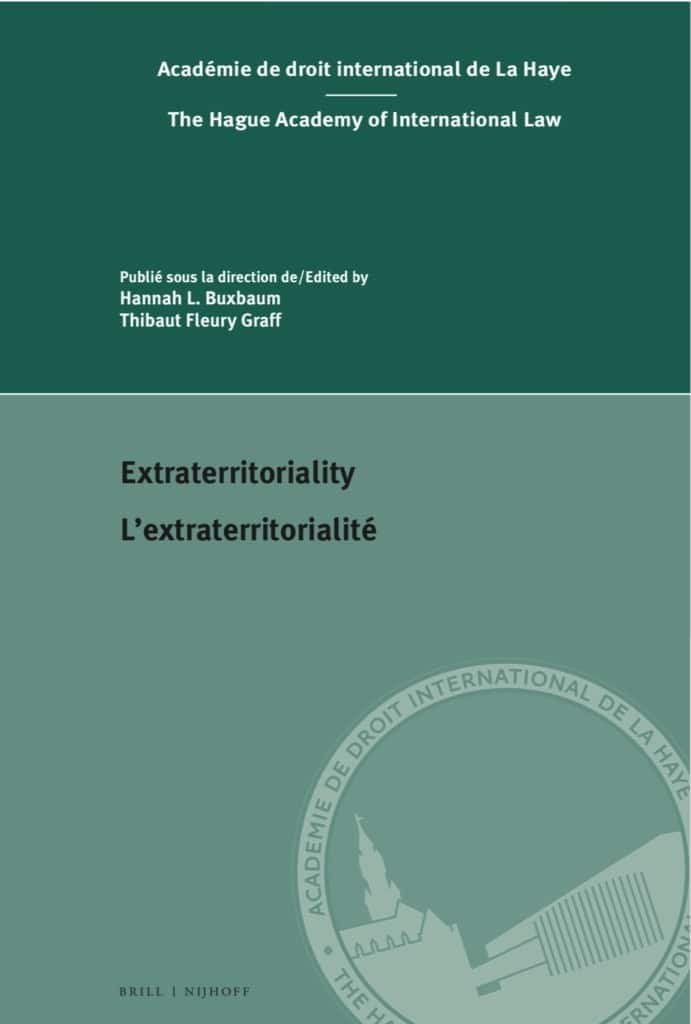District Court Interprets Geographic Scope of the Commodity Exchange Act
In a recent decision, CFTC v. WorldWideMarkets Ltd., the federal district court for the District of New Jersey (Judge Kevin McNulty) interpreted the geographic scope of the Commodity Exchange Act (CEA), holding that two of its provisions apply only when irrevocable liability for a transaction is incurred within the United States. The decision aligns the…
Continue ReadingSurveying Extraterritoriality
TLB advisor Hannah Buxbaum has posted to SSRN a piece entitled “The Practice(s) of Extraterritoriality.” It is an introductory chapter from the book Extraterritoriality/L’extraterritorialité, edited by Buxbaum and Thibaut Fleury Graff, which grew out of the 2019 Centre for Studies and Research at the Hague Academy of International Law. Buxbaum’s chapter is a masterful survey of extraterritoriality…
Continue ReadingThrowback Thursday: Timberlane Lumber Co. v. Bank of America
Although the relevant text of the Sherman Act remained unchanged for most of the twentieth century, courts’ interpretations of its extraterritorial reach fluctuated dramatically. In 1909, the U.S. Supreme Court adopted a territorial approach in American Banana, described in a recent post, holding that the Sherman Act applied only to anticompetitive conduct in the United…
Continue ReadingComparing Extraterritoriality in the EU
How a court decides whether a statute applies extraterritorially is a fundamental question in transnational litigation. TLB has lots of information about the U.S. approach. Our Primer on Extraterritoriality describes the federal and state approaches, as well as the customary international law rules on jurisdiction to prescribe. Recent posts have discussed the extraterritorial application of…
Continue ReadingThe Extraterritorial Application of State Wage and Hour Laws
Many U.S. states have enacted wage and hour laws. These laws generally set a minimum wage and require employers to pay overtime. When a company headquartered in one state hires an employee to perform work in a foreign country, however, it is not always clear which jurisdiction’s laws will apply. Is the payment of wages…
Continue ReadingThrowback Thursday: American Banana and the Presumption Against Extraterritoriality
Today, it is “well established” that U.S. antitrust law applies extraterritorially to foreign conduct that causes substantial effects in the United States, but this was not always true. When the Supreme Court first addressed the geographic scope of the Sherman Act in 1909, it held that the act applied only to conduct in the United…
Continue ReadingSection 230 and the Presumption Against Extraterritoriality
The Ninth Circuit opinion in Gonzalez v. Google (2021) raises important questions about how the presumption against extraterritoriality applies to immunity defenses invoked by social media companies under 47 U.S.C. § 230.Section 230 shields internet companies from civil liability for user-generated content hosted on their platforms. Gonzalezholds, effectively, that there is no conceivable application of…
Continue ReadingA Primer on State Law in Transnational Litigation
The procedural and substantive rules that U.S. courts apply in transnational litigation come from many sources, including the U.S. Constitution, international treaties, customary international law, federal statutes, federal rules, and federal common law (both preemptive and non-preemptive)—but also, state statutes, state rules, and state common law. This primer focuses on the underappreciated role of state…
Continue ReadingNinth Circuit Deepens Split over Extraterritoriality of Civil RICO
In a recent decision, Smagin v. Yegiazaryan, the Ninth Circuit weighed in on a circuit split involving the extraterritorial application of RICO’s private right of action. In determining whether there is injury to business or property in the United States, the court rejected the Seventh Circuit’s residency-based test, siding instead with the Second and Third…
Continue ReadingDistrict Court Holds that Magnuson-Moss Warranty Act Does Not Apply Extraterritorially
In a recent decision, Eichhorn-Burkhard v. Hill’s Pet Nutrition, Inc., a district court in Kansas (Judge Julie Robinson) held that the Magnuson-Moss Warranty Act (MMWA) does not apply extraterritorially to a U.S. company’s sales of dog food in Europe. The case provides a nice illustration of how U.S. courts apply the presumption against extraterritoriality to…
Continue Reading







